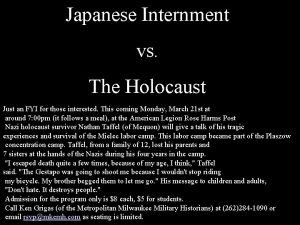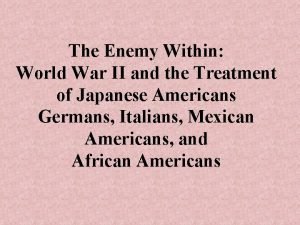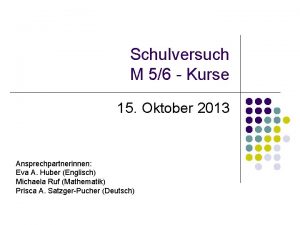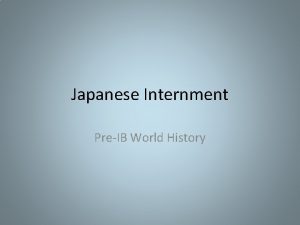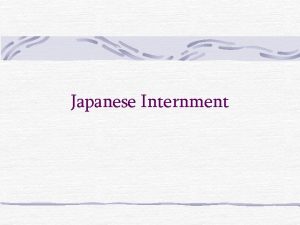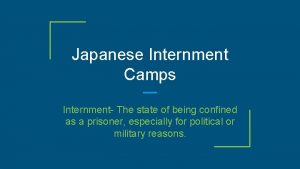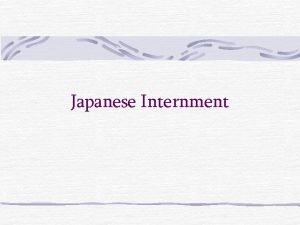JAPANESEAMERICAN INTERNMENT CAMPS PRISCA LIMAGE HISTORY 52413 JAPANESE






- Slides: 6

JAPANESE-AMERICAN INTERNMENT CAMPS PRISCA LIMAGE HISTORY 5/24/13

JAPANESE INTERNMENT CAMPS • Japanese American internment was the world war 2 internment in “War relocation camps of about 110, 000 people of Japanese heritage who lived on the Pacific coast of the United States. In 1942 shortly after the Imperial Japan’s attack on Pearl Harbor, the U. S. government ordered the internment. It was applied unequally as a geographic matter. All the Japanese who lived on the west coast were interned, while in Hawaii, where 150, 000 -plus Japanese-Americans comprised over one-third of the population, only 1, 200 to 1, 800 were interned. Sixty-two percent of the internees were American citizens. These internment camps were like prisons, many of those who were sent to internment camps had been born in the United States.

WHY IS IT IMPORTANT TO KNOW • Japanese Internment Camps were important in World War II, because the US Government was trying to make sure that none of the Japanese-Americans could contact their homeland tell them what's going to happen in the US. When the Japanese attacked Pearl Harbor, many Americans saw the Japanese-Americans as a fifth column. This meant that they viewed the Japanese-Americans as secret spies for Japan and inherently disloyal to the United States. Strangely, from a modern perspective, German-Americans, Irish-Americans, and Italian-Americans, who were much more vociferous opponents of US military policy in World War II were not even considered for discriminatory treatment, showing that this boils down to racism and fear of Asians more than it does legitimate security concerns. In order to deal with this perceived loyalty, the President Franklin D. Roosevelt issued Executive Order 9066 on February 19, 1942. This order was used to round up Japanese-Americans all along the Pacific coast (the largest area of Japanese. Americans in the United States) and place them in internment camps. In 1944, the US Supreme Court upheld the validity of the camps on the grounds of necessary military action. Surprisingly, the Japanese-American response was not to riot or protest, but to actively seek to assist the United States military in World War II. To "prevent" the Japanese-Americans from being in contact with other Japanese, most Japanese-American units were sent to the Italian Front, where some of them earned the highest amounts of commendations and medals. After the war, the Japanese-Americans were released from the camps without any property of money from which to make a living. However, many of them were resourceful and able to sustain themselves in the following decades.

INTERNMENT CAMPS INFLUENCE ON THE WAR • The Japanese-American internment camps influence the war because dew to the fact that Japan bombed Pearl Harbor rumors spread, fueled by race prejudice, of a plot among Japanese-Americans to sabotage the war effort.

THE POSITIVES • I just can't think of anything positive, sorry. . . nothing other than how we can learn from history and not imprison citizens on a massive scale like that again. It struck me that after being set free the Japanese had no thought of revenge especially when they lost everything, and they had to start their new lives with nothing.

THE NAGATIVE • Shock, fear, and worry were common initial psychological reactions as Japanese Americans were forced to deal with the stress of enforced dislocation and the abandonment of their homes, possessions, and businesses. Without information about where they were being taken, how they would be treated by the government, or how long they would be gone, uncertainty about their future loomed large. Added to these concerns was the larger psychological burden of being stripped of their civil rights and the unjust ethnic denigration of being suspected of disloyalty based onlyon their Japanese heritage.

